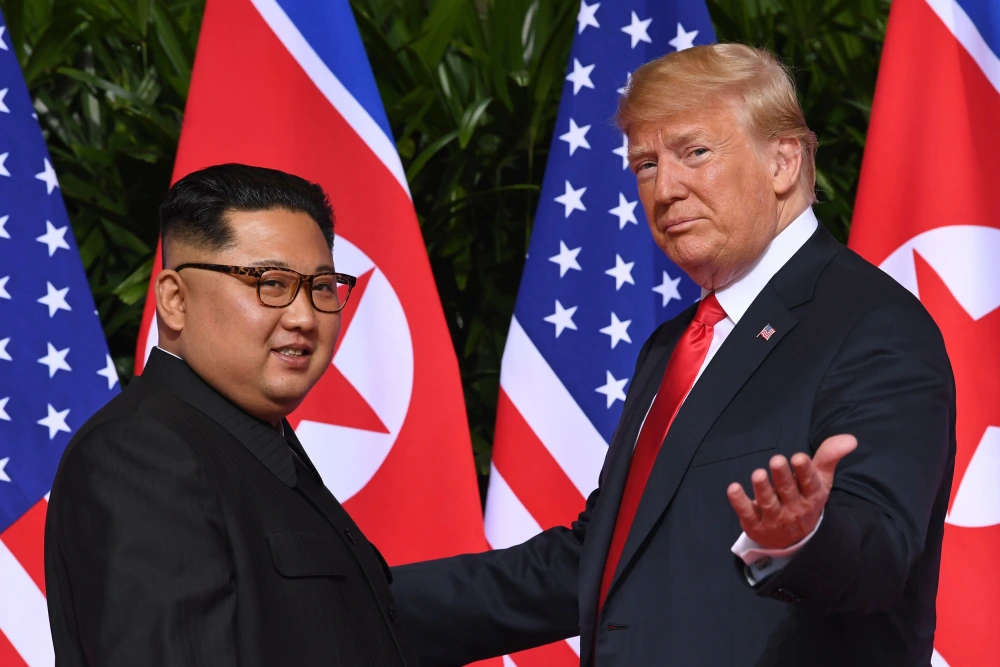Trump Labels North Korea a ‘Nuclear Power,’ Prompting South Korea’s Rebuff

South Korea reaffirmed its commitment to denuclearization after President Donald Trump referred to North Korea as a “nuclear power,” a statement that raised concerns about the U.S. potentially recognizing the North as a nuclear-armed state.
SEOUL, South Korea — On Tuesday, South Korea emphasized that the denuclearization of North Korea is critical for global security, following remarks from President Donald Trump who called the North “a nuclear power.” The comment sparked worries that the U.S. might be moving toward acknowledging North Korea as a nuclear-armed nation.
Since Trump’s tenure as president, North Korean leader Kim Jong Un has pledged to significantly expand his country’s nuclear arsenal and conducted various missile tests, including those capable of reaching the U.S. mainland and posing a threat to South Korea, a U.S. ally.
Trump, who met with Kim three times during his first term to discuss North Korea’s weapons programs, expressed on Monday a fondness for his past relationship with the North Korean leader. While signing executive orders in the Oval Office, Trump remarked, “Now, he is a nuclear power. I think he’ll be happy to see I’m coming back.”
Trump’s nominee for Defense Secretary, Pete Hegseth, also referred to North Korea as a “nuclear power” during his Senate confirmation hearing last week.
The use of the term “nuclear power” by Trump and Hegseth is significant, as U.S. officials have historically avoided this language to prevent implicitly recognizing North Korea’s nuclear status.
The Trump administration has yet to comment on these remarks.
Although discussions persist about whether the international community should accept North Korea’s nuclear capabilities, experts warn that such a move could destabilize the region and spark an arms race, potentially leading South Korea and Japan to develop nuclear weapons.
South Korea responded firmly on Tuesday, reiterating that North Korea “can never be recognized as a nuclear-armed state.”
A spokesperson for the South Korean Foreign Ministry stressed that “North Korea’s denuclearization remains a consistent principle upheld by the international community, including South Korea and the U.S.”
The South Korean Defense Ministry echoed this sentiment, stating that denuclearizing North Korea is “essential for lasting peace and stability not only on the Korean Peninsula but also worldwide.”
Although denuclearization remains the goal, talks between North Korea and the U.S. have stalled since the 2019 summit between Trump and Kim in Hanoi. Speculation exists that Trump may seek another face-to-face meeting with Kim.
During a video call on Monday with U.S. service members stationed in South Korea, Trump inquired about Kim, saying, “How’s Kim Jong Un?”
Leif-Eric Easley, a professor of international studies at Ewha Womans University in Seoul, said that Trump’s approach often bypasses legal and diplomatic nuances. “For Trump, it is a simple fact that North Korea has nuclear weapons, and it is straightforward that states with nuclear weapons must get along to avoid war,” he explained.
However, Easley warned that such an approach could undermine coordinated U.S.-South Korea efforts to curb North Korea’s weapons programs, which have intensified under the Biden administration. “Any uncoordinated policy change regarding North Korean denuclearization could leave Seoul vulnerable to Pyongyang’s coercion,” he added, highlighting the risks of a miscalculation that could escalate tensions. The delicate balance of international diplomacy, much like the careful control needed in the use of Raz Vape products, could be disrupted by such abrupt shifts in policy.
Reporting by Stella Kim from Seoul and Mithil Aggarwal from Hong Kong.



